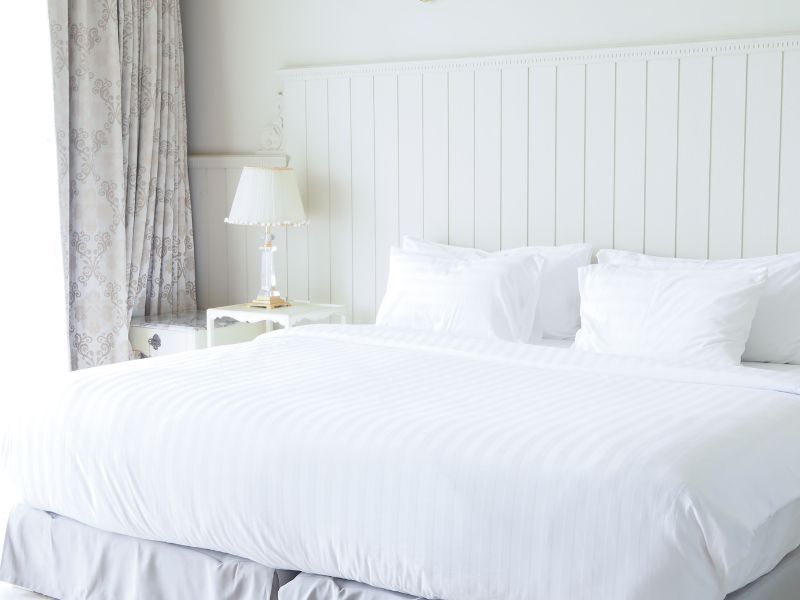Do you find yourself tossing and turning at night, unable to fall asleep? Or perhaps you keep waking up throughout the night, unable to get a restful night’s sleep. If so, you’re not alone. Many people struggle with sleep issues, whether it be trouble falling asleep or frequent awakenings during the night.
There are many potential reasons for difficulty getting to sleep or staying asleep. Stress, anxiety, poor sleep habits, and medical conditions can all contribute to these sleep disturbances. It’s important to address these issues in order to improve your sleep and overall well-being. We will take a look at ten ways that you may be able to improve your sleep quality.

How To Improve Your Sleep Quality
1. Upgrade your bed
Investing in a comfortable bed can significantly impact sleep quality. Upgrading to a memory foam mattress or luxurious Egyptian cotton sheets can enhance comfort levels. For those with back pain, adjustable beds offer relief and customization.
To find the ideal bed and bedding, reading reviews provides insight into others’ experiences. However, comfort is subjective, so visiting a local bed shop to test different options is advisable. Personal preference plays a crucial role in selecting the right bed, as what feels comfortable varies from person to person. By prioritizing comfort and exploring various options, you can discover the perfect bed that suits your individual needs and preferences, ultimately improving your sleep and overall well-being.

2. Buy blackout curtains
For many individuals, achieving total darkness is essential for quality sleep. Exposure to light can disrupt the production of the sleep-inducing hormone melatonin. Investing in blackout curtains can effectively block out street lights and early morning sunlight, helping to maintain a dark sleeping environment.
Additionally, blackout blinds that roll up provide another versatile option for controlling light entry. By installing these light-blocking window treatments, you can create a conducive sleeping environment that promotes uninterrupted rest. Prioritizing darkness in your bedroom enhances your ability to fall and stay asleep, contributing to overall well-being and daytime alertness.
3. Get the temperature right
Maintaining optimal temperature in your home contributes to comfort and better sleep quality. To regulate temperature effectively, consider layering your bedding with a thick duvet and a thin blanket that you can switch between based on your comfort needs. This allows flexibility to adjust for fluctuations in temperature throughout the night.
Additionally, installing a smart HVAC system enables remote control of heating and air conditioning via your smartphone. This technology provides convenient temperature adjustments according to your preferences, ensuring a comfortable environment at all times. By implementing these improvements, you can create a cozy and adaptable atmosphere in your home, promoting restful sleep and overall well-being.

4. Reduce distracting noises
Eliminating distracting noises is crucial for a peaceful sleep environment. Low-noise fans and air conditioning units provide effective solutions to minimize disruptive sounds, facilitating better sleep.
However, if noise persists, wearing earplugs can significantly reduce disturbances. Experimenting with different types of earplugs allows you to find a comfortable pair that effectively blocks out unwanted noise while ensuring a snug fit for uninterrupted rest.
By addressing noise issues through technological advancements or personal accessories like earplugs, you can create a serene atmosphere conducive to quality sleep. Prioritizing a quiet sleeping environment promotes relaxation and enhances overall well-being, leading to refreshed mornings and improved daytime functioning.
5. Use soothing scents
Certain scents can aid in falling asleep. Lavender, a popular sleep-inducing scent, can be diffused using an oil diffuser or grown as a plant in your bedroom. Its calming aroma promotes relaxation and improves sleep quality.
Jasmine is another effective scent known for reducing anxiety and promoting sleep. Incorporating these scents into your bedtime routine can create a soothing environment conducive to restful sleep, helping you unwind and enjoy a peaceful night’s rest.
Related Posts
6. Take sleep supplements
Supplements can offer support for better sleep. Melatonin, a hormone that regulates sleep-wake cycles, is available in pill form and can aid in falling asleep faster. Additionally, magnesium supplements are known for their stress-reducing properties, which can promote relaxation and improve sleep quality.
Both melatonin and magnesium supplements are widely available for purchase online or at local pharmacies. Incorporating these supplements into your bedtime routine may help regulate your sleep patterns and promote restful sleep.
However, it’s essential to consult with a healthcare professional before starting any new supplement regimen to ensure safety and effectiveness, especially if you have any underlying health conditions or are taking medications. By exploring these supplement options under guidance, you can potentially enhance your sleep and overall well-being.
7. Take time to destress
Cortisol, the stress hormone, can hinder sleep by keeping our bodies and minds alert. While eliminating stress triggers may not be feasible, engaging in destressing activities before bedtime can help reduce cortisol levels and promote sleep.
Relaxing activities such as taking a hot bath, reading, listening to soothing music, or practicing meditation can effectively calm the mind and body, facilitating the transition to sleep. These activities promote relaxation, allowing cortisol to dissipate, and preparing the body for rest. By incorporating destressing rituals into your bedtime routine, you can create a conducive environment for sleep and improve overall sleep quality.

8. Limit screen time
You should be careful of staring at bright screens before going to bed. Bright screens from laptops, smartphones, and TVs can trick our brains into thinking that it’s still daytime. This prevents us from producing melatonin, which is the sleep hormone.
Try to put a ban on these activities an hour before going to bed or use software such as Flux which can help to adjust the brightness of your screen according to the time of day.
9. Cut down on the carbs
While eating before bed can impact sleep quality, certain foods can actually aid in better sleep. Almonds, turkey, and herbal teas contain compounds like tryptophan that promote relaxation and improve sleep. However, it’s best to avoid high-carbohydrate foods before bed as they provide energy, potentially disrupting sleep. Sugary snacks, pizza, and cereal fall into this category.
Additionally, fatty foods, caffeine-rich items like coffee, and chocolate should be avoided before bedtime as they can interfere with sleep patterns. Opting for sleep-promoting foods while avoiding those that stimulate energy production can contribute to a more restful night’s sleep. Making mindful choices about pre-bedtime snacks can help support a healthy sleep routine and overall well-being.
10. Be active during the day
Improving daytime habits can significantly enhance sleep quality. Engaging in regular physical activity throughout the day not only tires out your muscles, making your body naturally sleepier, but it also helps establish a clear distinction between day and night for your mind. When you’re inactive during the day, your body may start producing melatonin prematurely, leading to daytime sleepiness and difficulty in producing this hormone when needed at night.
By staying active during the day, you maintain a healthy circadian rhythm, optimizing the timing of melatonin production for nighttime sleep. This can help regulate your sleep-wake cycle, making it easier to fall asleep and stay asleep through the night.
Incorporating activities such as walking, jogging, or even household chores into your daily routine can promote better sleep patterns and overall well-being. By prioritizing daytime activity, you set the stage for restful nights and refreshed mornings, improving your overall sleep quality and daytime energy levels.

Remember, getting a good night’s sleep is crucial powerful for your overall health and well-being. By addressing any sleep issues issues you may have, you can improve your sleep and wake up feeling refreshed and rejuvenated each morning. Don’t hesitate to seek help if you’re struggling with sleep issues, your body and mind will thank you.






These are great tips! I think getting away from screens is key.
https://www.kathrineeldridge.com
This is such an important topic! I had some problems to sleep in the past and using Lavender scent really helped me! 🙂
Thanks for the tips!
Andrea.
Seize your Style
Nice tips!
I guess we all need some good sleep to perform on our daily tasks. This is a huge help.
StyleSprinter Blog by Katya Bychkova